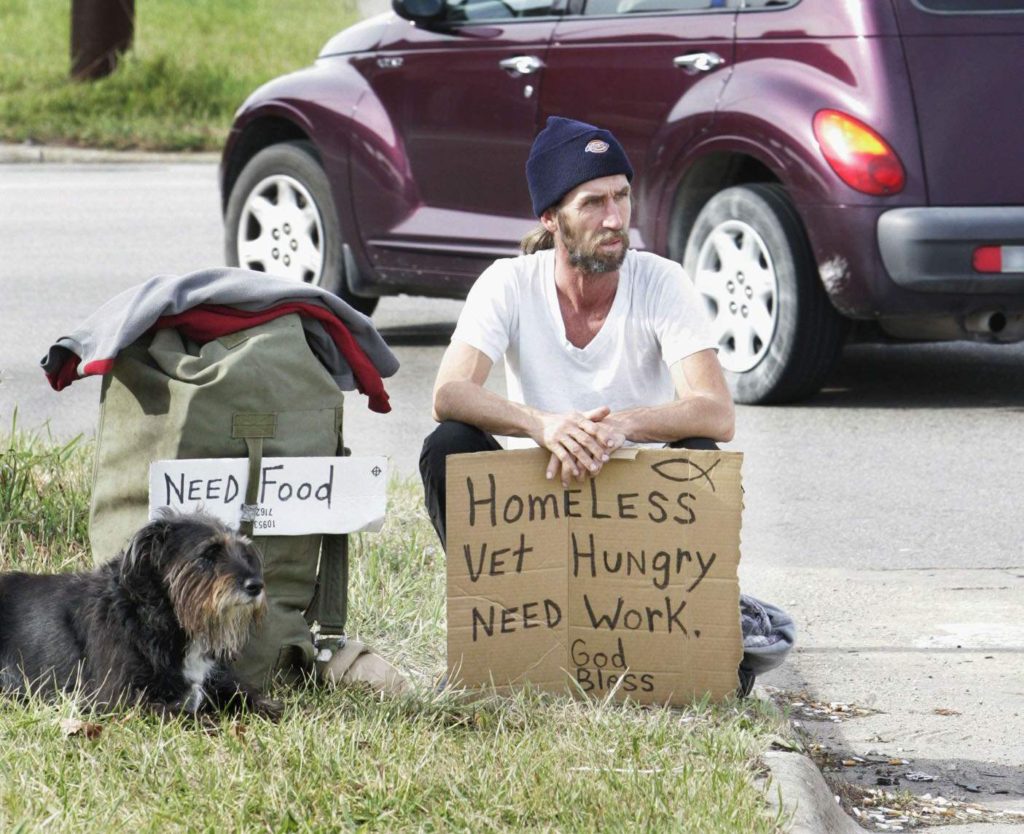With an eye toward the city of Cedar Rapids’ latest ordinance intended to curtail roadside panhandling, I took to social media and the streets Thursday with my writing hand extended.
“Does the city need to do something about panhandling?” I asked friends and strangers alike. “And, if so, what?”
My very non-scientific survey revealed that most — roughly 90 percent of the more than 100 people who engaged with me — don’t believe panhandling is a problem in Cedar Rapids. Several of these individuals spoke of panhandling situations in larger cities, where they’d been aggressively pursued by panhandlers on sidewalks or had received some unwanted service from a roadside panhandler, such as windshield cleaning. Those are not experiences they’ve had in Cedar Rapids and, more simply, they don’t see the number of panhandlers here that they’ve seen elsewhere.
Nearly all of those surveyed said they’ve developed personal means testing to determine if they give and what they give.
“I have been in bigger cities where aggressive panhandling is a problem and kind of scary,” said Sarah F. “I don’t give them money because I feel like they are working for tips like I do. I don’t have spare money to hand out. If I did that, I could be just as broke. I’m not far enough ahead financially.”

Skepticism exists, with many wondering about the panhandlers’ back stories and how donations are spent.
“I give sometimes,” said Brian K. “I’m more apt to give to street performers, which I usually see only in bigger cities. When I give to someone just standing and asking, I wonder if it’s really going to be spent on food or shelter, or if there is a real need behind the request. I give because I think it will make me feel better to be helping someone else, but it usually doesn’t.”
Brian and other metro residents expressing similar sentiments might benefit from the advice of Pope Francis, offered in an interview with a magazine about homelessness published earlier this year and translated by the Catholic News Service. The Pope says to give, to treat panhandlers with the dignity and compassion all people deserve, and not worry how the donation is spent.
Among the poor and within poor neighborhoods, the Pope said, drugs and other addictions are more noticeable and appear more prevalent only because substance abuse is more “covered up” among “white-collar” abusers in more affluent environments.
A woman headed into a grocery store refused to give her name, but did say she thought the city was being proactive against “a government agenda that further marginalizes the poor.”
“State and national government is busy cutting services that people need — housing assistance, medical assistance, therapy help, food banks. They cut money for victims of crime like domestic violence. If that continues, we’re going to see more and more people on the streets and begging,” she said.
It’s hard to deny her logic when services are being drastically cut and members of the Cedar Rapids City Council have mentioned the aesthetics of panhandlers in relation to how it makes the city look to outsiders. To this, Mona S. was direct: “It’s already against the law to harass people. Report any one who does. But how ‘it looks’ is a terrible reason.”
Former Iowa Sen. Tom Courtney responded on social media, saying people should encourage the Legislature to raise the minimum wage “so people can make enough money so they don’t have to panhandle.”
A good first step, poster Lori M. replied, “would be repealing the law … that made it illegal for individual counties to set their own minimum wage,” noting that cost of living varies from county to county.
Linn County Supervisor Brent Oleson pondered if something could be done to “stop all the panhandling by TIF requesters too.”
Right now, nearly everyone agreed, whether or not to give comes down to personal choice. If panhandling is made a crime, punishable by jail time or a fine, that choice is taken away.
“Is someone who is begging able to pay a $50 or $100 fine? I don’t think so,” said Helen S. “Can that person afford an attorney? More likely we, the taxpayers, are going to pick up the tab for room and board in the county jail and public defenders.”
And, finally, some surveyed questioned the wisdom of pushing panhandling off roadsides, which is the thrust of the proposed Cedar Rapids ordinance, and into other areas.
“Maybe this is just me, but I’d much rather be in my car at an intersection than unprotected in a parking lot or on a sidewalk when I’m approached,” said Amy R.
Her companion, Greta B., agreed. “That’s when it is really uncomfortable, when you don’t feel like you can escape it. A person with a sign on the side of the road is very passive and not threatening, but someone coming up behind you like has been done to me previously raises immediate personal safety concerns.”
The city should look to what other locations with larger problems are doing, suggested a few. Maybe, they offered, it’s time to get more creative by offering a place people can go for day jobs that pay quick cash, or by investing more in existing local infrastructure like shelters and mental health clinics.
Even the very few who advocated full criminality for panhandling, a citywide prohibition on begging that would land all perpetrators in jail, believe the city’s latest proposal only pushes the problem elsewhere, most likely into the hands of area retailers.
This column by Lynda Waddington originally published in The Gazette on July 16, 2017. Photo credit: The Gazette archive
